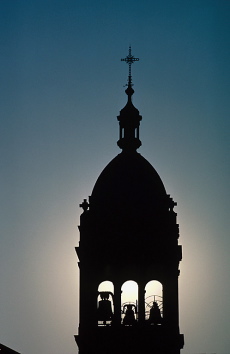
7 December 2004 — The discreet drive, which the Roman Catholic Church first mentioned publicly last Friday, seeks official recognition by the UN and other international organisations of discrimination against and persecution of Christians.
The UN Human Rights Commission in Geneva now speaks of “anti-Semitism, Islamophobia and Christianophobia,” terms the current General Assembly in New York is due to approve later this month.
Radical Christian activists however have expressed unease about such a move. “Obviously we have seen many countries where Christian minorities are in danger, but we don’t think this is the appropriate way to really ensure protection,” said Alessandra Aula of Franciscans International.
“What we fear is that this is the way to start eroding universal human rights. You will then have Sikhs and Buddhists and all the others coming and claiming rights. Where does it end?”
The move by the Vatican may also be interpreted as double standards by Christians defending their own self-interest depending upon whether they feel they are in a majority or a minority.
It comes as Christian groups in the UK joined with celebrities to oppose laws against incitement to religious hatred on the grounds that it might prevent their evangelistic activities.
Doudou Diene, the U.N. special rapporteur on racism and xenophobia, said specifying certain religions was only acceptable if the universal nature of religious discrimination was also noted. He said the problem arose because some countries tried “to put a hierarchy among different forms of discrimination.”
Drew Christiansen, deputy editor of America magazine in New York told Reuters; “Christians have a sense of being a privileged majority, so we don’t see ourselves as victims.”
Vatican officials say privately they could not stand aside while Judaism and Islam got special attention at the U.N., which demands regular status reports from member countries on issues officially recognised as problems of international concern.
Archbishop Giovanni Lajolo, the Vatican’s foreign minister, said anti-Christian feeling had increased, exacerbated by the war on terrorism. He said Christianity was often mistakenly seen as being inextricably linked with Western political policy, and had suffered as a result in the backlash against the West.
His comments, at a conference in Rome, were primarily aimed at Middle Eastern countries such as Iraq, where insurgents have bombed a number of churches.
“It should be recognised that the war on terrorism, even though necessary, had as one of its side-effects the spread of ‘Christianophobia’ in vast areas of the globe,” Archbishop Lajolo told the conference.
The Holy See however is also pressing its point in the light of two setbacks this year when the EU refused to refer to the continent’s Christian heritage in its new constitution and turned down a traditionalist Catholic as a new commissioner. Cardinal Joseph Ratzinger said last month that parts of Europe were now so secular that Christianity was being pushed into the margins.
Speaking to reporters after his speech, the Archbishop Lajolo said anti-Christian and anti-Catholic sentiments were not only to be found in Muslim countries. Hostility existed in states where Church-sponsored schools or charities were perceived as thinly-veiled attempts at proselytism.
The World Council of Churches (WCC), which is also based in Geneva and unites over 340 Protestant and Orthodox churches around the globe, said it was not consulted on the new term “Christianophobia”. “There is always a risk with these kinds of labels,” said WCC international affairs director Peter Weiderud. “It’s not helpful to look at the problem as one religion against another.
© 2004 Ekklesia. Posted on Religioscope with permission. An initiative of the Anvil Trust, Ekklesia is a not-for-profit think-tank which works to promote theological ideas in the public square. Website: www.ekklesia.co.uk